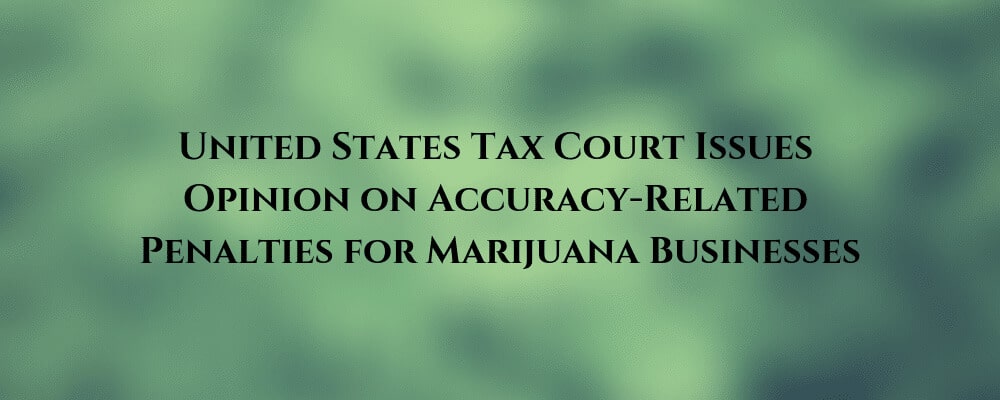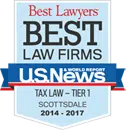The Banking, Cash, and Tax Challenges Confronting Nevada Marijuana Businesses Nevada voters approved “recreational” marijuana…
United States Tax Court Issues Opinion on Accuracy-Related Penalties for Marijuana Businesses
On November 29, 2018, The United States Tax Court issued an opinion providing further guidance to state regulated marijuana businesses on the issues of business deductions, cost of goods sold, and whether a marijuana business operates a separate trade or business. Patients Mutual Assistance Collective Corp. d.b.a. Harborside Health Center v. Commissioner, 151 T.C. No. 11 (“Harborside ”). The Court decided unequivocally that section 280E disallowed Harborside’s deductions for ordinary and necessary business expenses. The Court also found that section 263(a)(2) precluded Harborside’s capitalizing those expenses.

But the Court did not decide whether Harborside was liable for section 6662(a) accuracy-related penalties. On December 20, 2018, the Tax Court issued its second Harborside opinion finding that the business was not liable for any penalties.
Accuracy-Related Penalties Under Section 6662
Section 6662(a)(1) and (b)(1) and (2) impose a 20% penalty on the portion of an underpayment attributable to any substantial understatement of income tax or negligence or disregard of rules or regulations. Negligence includes any failure to make a reasonable attempt to comply with the provisions of the Code, and disregard includes any careless, reckless, or intentional disregard. A corporation’s understatement of income tax is substantial when it exceeds the lesser of $10 million or “10 percent of the tax required to be shown on the return for the taxable year (or, if greater, $10,000).” Sec. 6662(d)(1)(B). A taxpayer can avoid penalties by showing that it acted with reasonable cause and in good faith. Sec. 6664(c)(1); sec. 1.6664-4(a), Income Tax
The IRS’ Concession and the Court’s Penalty Decision
By the time the case went to trial, the IRS conceded that Harborside was not negligent and relied solely on the tax understatements in arguing that Harborside was liable for accuracy-related penalties. And the understatements were substantial because the Court found in its first opinion that Harborside had understated its tax by well over 10% in each of the six years at issue (2007 through 2012). This teed up Harborside’s argument that it acted with reasonable cause and in good faith in taking the positions it stated on each of its returns.
Harborside argued that it had reasonable cause because from 2007 until 2012, the only relevant case related to marijuana business expense deductions was CHAMP, 128 T.C. 173 (2007) and that the IRS has never promulgated regulations under section 280E and didn’t issue guidance on a marijuana businesses’ capitalization of inventory costs until 2015. See Chief Counsel Advice 201504011 (Jan. 23, 2015).
Further, by the time the Tax Court’s decision in Olive (139 T.C. 19 (2012), aff’d, 792 F.3d 1146 (9th Cir. 2015)) was affirmed on appeal, Harborside’s returns for the years at issue had already been filed. Therefore, the Court found that Harborside’s reporting positions were reasonable from 2007 through 2012 and that Harborside acted with reasonable cause and in good faith.
A key fact underpinning the Court’s decision was that Harborside kept good books and records: “Keeping good books and records was one of Harborside’s strengths, and the Commissioner agreed in pretrial stipulations . . . that Harborside had substantiated all its claimed deductions and COGS for all the tax years at issue and that all of them were paid or incurred in a trade or business.”
The Court also noted that it has previously declined to impose accuracy-related penalties when there is no clear authority to guide taxpayers.
Going forward, in order to avoid IRS penalties, it is necessary for marijuana businesses – such as a cannabis dispensary – to keep meticulous books and records and to take reasonable positions on their returns. Guidance on COGS is becoming clearer with each opinion issued by the Court, and marijuana businesses need to pay close attention to the case law and any potentially forthcoming IRS regulations.
If you own a business selling, growing, or producing marijuana, you need to partner with an experienced Arizona tax lawyer to understand your tax rights and responsibilities. The landscape is changing rapidly you need a legal advocate on your side to help you navigate it all. If your business is audited and you don’t have detailed information about every single transaction, you risk forfeiting your COGS claim and you could be subject to penalties for filing an inaccurate tax return.
Silver Law PLC operates in Arizona and Nevada and all of its lawyers are former trial attorneys for the IRS. A tax lawyer from our team can help you understand how the complex Tax Code applies to your marijuana business operations. We’ll help you ensure that you are meeting your obligations. If you have been audited or are facing collections, we are also in a position to help you navigate that process. We can either find ways to bring down your tax debt or can negotiate a settlement for you. Call us today to talk with a tax lawyer and learn more.

Email: lchapman@silverlawplc.com
Website: taxcontroversy.com
Arizona Location
7033 E. Greenway Pkwy, Ste 200
Scottsdale, AZ 85254
Office:(480) 429-3360
Henderson Location
410 South Rampart Blvd, Suite 390
Las Vegas, Nevada 89145
Office: (702) 801-1000
Las Vegas Location
410 South Rampart Blvd, Suite
390 Las Vegas, Nevada 89145
Office: (702) 726-6819
San Diego Location
7676 Hazard Center Drive, Suite
1525 San Diego, CA 92108
Office: (619) 387-3790
Coronado Location
724 1st St.
Coronado, CA 92118
Office: (619) 612-5337
Utah Location
11576 S. State Street, Suite 1002
Draper, Utah 84020
Office: (801) 340-7514
















Leave a Reply
You must be logged in to post a comment.